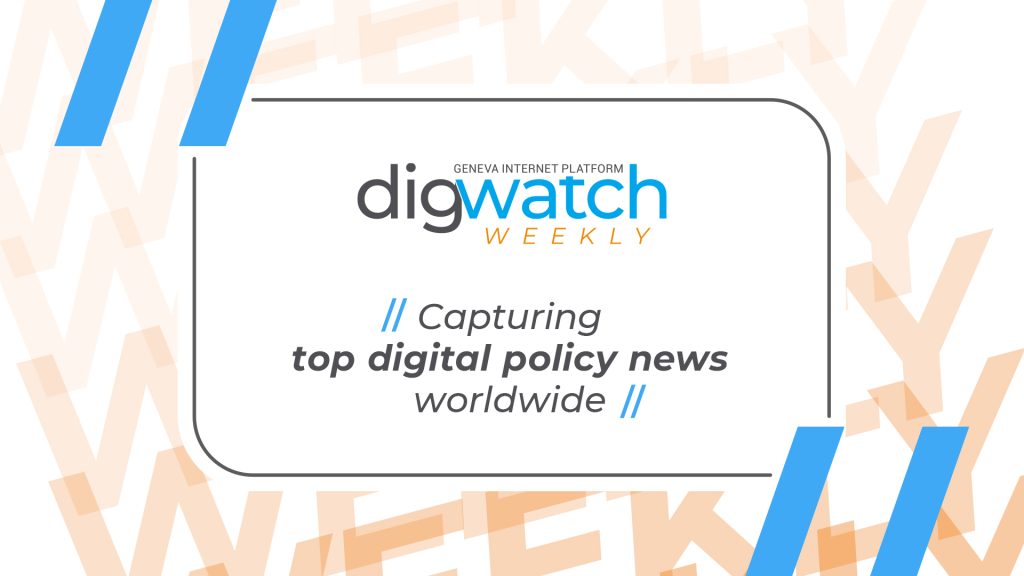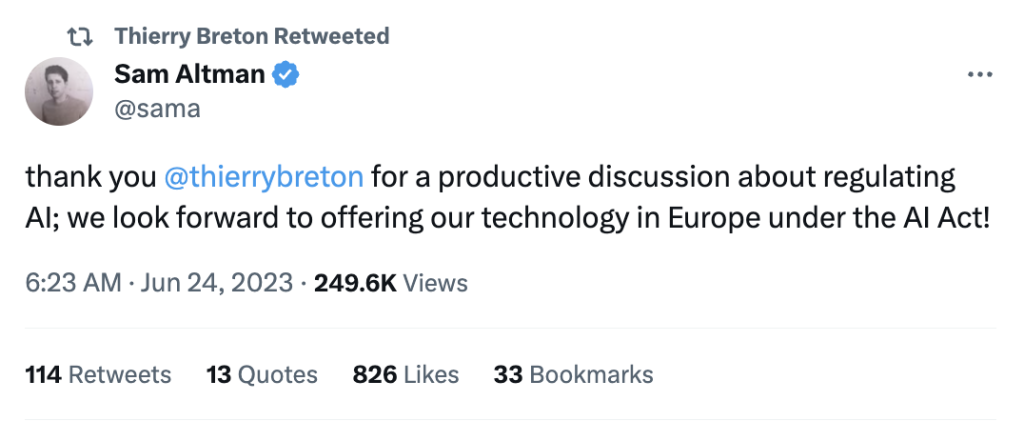
Dear all,
Last week’s European Commission visit to San Francisco was more than a formality: it cemented a commitment by US tech giants to adhere to Europe’s new rules. In other news, new AI rulebooks and investigations are coming soon, while Google and Apple stores are undergoing antitrust reviews in India.
Let’s get started.
Stephanie and the Digital Watch team
// HIGHLIGHT //
Twitter, Meta ‘not dragging their feet’ on DSA compliance, says Breton after Silicon Valley meeting
If last week’s San Francisco meeting was aimed at reminding Big Tech that the Digital Services Act (DSA) clock is ticking, European Commissioner Thierry Breton achieved his goal: ‘They are not dragging their feet,’ he said this morning (26 June) on France Inter, referring to the 25 August cut-off date for implementing the complete set of DSA obligations. ‘I want to make that very clear. They have committed themselves.’ (Here’s the transcript in French, and a translation to English.)
Mark Zuckerberg, CEO of Meta, which owns Facebook and Instagram, Elon Musk, Twitter chairman, and Sam Altman, CEO of OpenAI, the startup behind ChatGPT, were among those Breton met during the two-day trip that also included the launch of the EU’s San Francisco office.
The DSA is about preserving innovation while protecting individual freedoms, in Breton’s words. But in truth, Big Tech wants to continue offering services in Europe – a digital market which is too large to ignore. After the 25 August deadline, non-compliance can result in hefty fines, which the EU will not hesitate to impose. Overall, Big Tech gets the big picture.
Twitter will comply with the DSA – Musk
Of the two giant social media companies, Meta was not Breton’s biggest worry. In fact, the commissioner was impressed with Mark Zuckerberg last week, saying he recognised all of the articles of the law and was enthusiastic about it.
Rather, it’s Twitter which was causing headaches: The company ditched the EU’s disinformation charter last month, and had European leaders worrying that Twitter wouldn’t be willing to comply with the rules. The fact that Twitter committed to the obligations of the DSA is positive news for regulators.
We actually heard it from Elon Musk himself in a France 2 interview last week. In a somewhat humorous tone, he said it wasn’t the first time he was iterating that Twitter will comply with the law and adhere to regulations. He added a cautious note though: adhering to the law is the limit of Twitter’s intentions, as going beyond what is lawfully required would mean going ‘beyond the will of the people as expressed by the law’. Beyond the DSA, whether intentional or not, Twitter is signalling that it values binding rules much more than voluntary ones – a sentiment that many companies do not share.
Of course, the real proof of Big Tech’s adherence to the DSA will come after the deadline. So what European regulators can do right now is to continue their stress tests to assess the readiness of the industry, which is what Commissioner Breton’s team did, in fact, prior to his Twitter HQ visit (Meta’s stress test is in July). The outcome hasn’t been disclosed, but Commissioner Breton’s upbeat remarks this morning are another indication that Twitter is on track to implement Europe’s new rules.

Friends again
Breton’s conversation with OpenAI’s Sam Altman was about the EU’s upcoming AI Act, and the AI pact – a set of voluntary guidelines which Breton devised to help companies prepare for implementing the AI Act. What stood out wasn’t what the two said during the meeting, but what they tweeted right after. The two have come a long way since their recent misunderstanding.
// AI GOVERNANCE //
US lawmaker releases AI framework
US Senate Majority Chuck Schumer, who in April announced the need for AI rules, has now released his SAFE Innovation Framework.
He has also announced a series of AI Insight Forums, starting in September, which will serve as building blocks for new US AI policy. The experts will be a part of what Schumer describes as ‘a new and unique approach to developing AI legislation’.
Why is it relevant? First, the one-pager mentions China (twice) as a cause for concern. The lawmaker thinks the Chinese Communist Party may be able to set AI standards and write the rules of the road for AI ahead of anyone else. Interestingly, there’s no mention of the EU, whose proposed AI Act is moving ahead quickly.
Second, Schumer thinks it will take (only) months for Congress to pass AI legislation. It’s ‘exceedingly ambitious’, to quote Schumer himself.
Consumer groups call for more ChatGPT investigations
Consumer groups across 13 European countries are urging their national authorities to investigate the risks posed by generative AI such as ChatGPT. They’re also asking them to enforce existing laws to safeguard consumers.
The statement, timed to coincide with the publication of a Norwegian consumer group’s report on the consumer harms of generative AI, says the new technology carries many risks, including privacy and security issues, and results which can be inaccurate and can manipulate or mislead people. The organisations also say that consumer groups in both the USA and EU are writing to US President Joe Biden on behalf of the Trans-Atlantic Consumer Dialogue (TACD) on this issue.
Why is it relevant? The call adds more pressure on regulators, especially data protection authorities, to investigate OpenAI, the company behind ChatGPT. So far, tens of investigations have been launched; the list continues to grow.
New AI guidebook in the making in ASEAN region
ASEAN countries are planning an ASEAN AI guide that will tackle governance and ethics, Reuters has reported exclusively. The agreement was made in February, but the development became known only a few days ago.
Discussions are in their early stages; the guidebook is expected to be released at the end of this year, or early next year.
Why is it relevant? More countries and regions are developing AI rules, which means that unless there’s a concerted effort to build on each other’s work, the world will end up with unharmonised – albeit broadly similar – rules at best. At worst? A patchwork of rules built on a conflicting set of values and priorities.
// SEMICONDUCTORS //
Intel invests in chip fabs in Germany; EU woos Nvidia
Intel has expanded its investment to build two new semiconductor facilities, known as fabs, in Germany. The company will invest EUR 30 billion (USD 32.8 billion), and will receive subsidies worth nearly EUR 10 billion (USD 10.9 billion) from Germany. German Chancellor Olaf Scholz hailed the new agreement as the country’s biggest-ever foreign investment.
Intel is unlikely to experience a shortage of skills: There are around 20,000 technology students residing in Magdeburg, where the semiconductor fabrication plants (or fabs) will be built. The company is expecting the first plant to start operating within four-to-five years after the European Commission’s subsidies approval.
Across the pond, European Commissioner Thierry Breton took the opportunity of his San Francisco trip to visit NVidia CEO Jensen Huang. The CEO said Breton encouraged him to invest ‘a great deal more’ in Europe, which is going to be a ‘wonderful place to build a future for Nvidia’.
Why is it relevant? Both the USA and Europe are vying to attract semiconductor companies to their shores. But right now, it’s Europe that is beckoning.

Was this newsletter forwarded to you, and you’d like to see more?
// ANTITRUST //
Google asks Indian court to quash regulator’s antitrust ruling
This morning (26 June), Google requested India’s Supreme Court to quash antitrust directives which the country’s competition regulator imposed on the company for allegedly exploiting its dominant position in India’s Android mobile operating system market.
In March, a tribunal modified four of the ten directives imposed by the Competition Commission of India (CCI) in October, which allowed the company to sustain its current business model. Google is now asking that the remaining directives be stopped and that the court revoke the regulator’s earlier antitrust ruling.
Why is it relevant? The tug of war has already been partially won by the tech giant. The rest of it could go down in one of two ways: If the court confirms the March ruling, it’s status quo for the company; if the court rules that Google did not abuse its position, it’s a significant win for Google, which could influence other cases with other giant tech companies…
Indian competition regulator set to rule on Apple’s app store policies
The CCI is set to rule soon on Apple’s app store billing and policies. The regulator launched its investigation in 2021, but the process stalled after the commission’s chairman retired in October 2022.
Why is it relevant? On the one hand, the case is similar to Google’s case, prompting the regulator to go down the same path. On the other, the regulator’s ruling in Google’s case was revised on appeal, and is now subject to another lawsuit, which may influence the regulator’s final decision.
// E-VOTING //
Switzerland positive after e-voting trial
Swiss voters are shining a good light on a recent e-voting trial, which saw participation rates higher than the national average rate for Swiss voters abroad as a whole. The e-voting software, developed by the Swiss Post, was reviewed after the flaws reported in 2019, and approved for trial in three cantons by the Federal Chancellery earlier in March.
Why is it relevant? Despite warnings from some Swiss parliamentarians, the outcome of this trial could open the door for Swiss voters living abroad to use the e-voting system in parallel to traditional mail-in ballots. It could also encourage countries where e-voting has either been abandoned (such as recently in Latvia) or never explored. (For reference, here’s where the world stands on e-voting right now).
19 June–14 July: The four-week 53rd session of the Human Rights Council is ongoing in Geneva and online. What to watch for:
- 3 July: A panel discussion on the role of digital, media, and information literacy in the promotion and enjoyment of the right to freedom of opinion and expression (HRC res. 50/15)
- 6 July: A discussion on the report on the relationship between human rights and technical standard-setting processes for new and emerging digital technologies and the practical application of the Guiding Principles on Business and Human Rights (A/HRC/53/42)
Dates may change. Consult the agenda and the latest programme of work. Refer also to the Universal Rights Group’s The Inside Track covering HRC53.
29 June: The EU’s new Regulation on Markets in Crypto-assets, also known as the MiCA regulation, enters into effect today (and will start applying from December 2024). It will regulate crypto-asset issuers and service providers at the EU level for the first time.
1 July: Spain takes up the presidency of the EU Council; a new trio of rotating chairs (Spain-Belgium-Hungary) starts today till the end of 2024. The next elections will be held during Belgium’s presidency.
For more events, bookmark the Digital Watch Observatory’s calendar of global policy events.

An atlas on SDGs
Where do countries stand in their goals to achieve the 2030 Agenda? The World Bank’s 2023 Atlas of Sustainable Development Goals tells us how far countries have come – and what more needs to be done. It draws from the World Bank’s database of indicators and multiple other sources.
SDG practitioners will be happy to learn that the visualisations, together with all the data and code can be downloaded and used for similar purposes.


